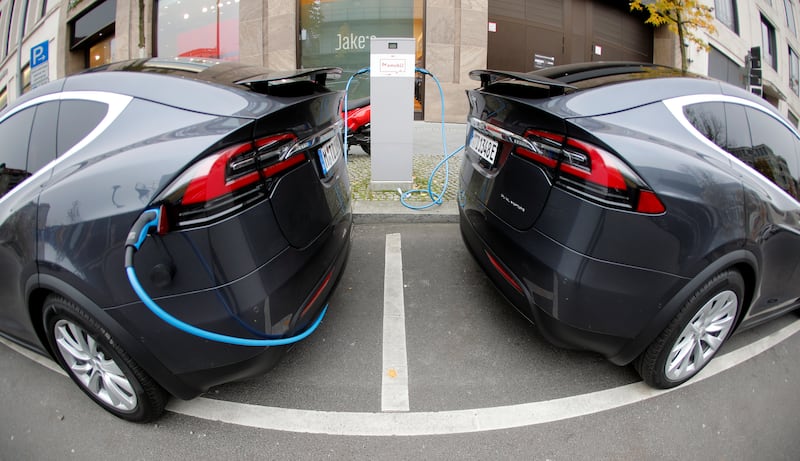American electric carmaker Tesla has signed contracts worth several billion U.S. dollars to purchase nickel from two companies in Indonesia, a government minister in Jakarta said Monday.
The Southeast Asian country has been trying to woo Tesla for the past few years as it tries to take advantage of being the world’s largest producer of nickel, a critical element in batteries for electric vehicles (EVs).
Tesla agreed to a five-year contract with nickel processing companies including Zhijang Huayou, a Chinese mining company that operates plants in Morowali, a regency on Indonesia's nickel-rich Sulawesi island, said Luhut Pandjaitan, the coordinating minister for investment and maritime affairs.
“The good news is they [Tesla] have purchased [nickel] products from Indonesia,” Luhut told CNBC Indonesia in an interview.
“The contract is probably worth around U.S. $5 billion.”
The announcement came less than three months after President Joko "Jokowi" Widodo visited Tesla founder and CEO Elon Musk in Texas, and despite environmental advocacy groups warning in late July that the Indonesian nickel industry was polluting rivers and damaging rainforests.
Luhut said Tesla’s planned investment in Indonesia had been delayed, among other things, by a bid by Musk to buy Twitter, the social media giant.
Indonesian media reported that the other company that signed a contract for nickel with Tesla was CNGR Advanced Material, a Chinese battery maker.
According to Luhut, the Ford Motor Company, another U.S. carmaker, as well as Germany’s Volkswagen had also signed cooperation agreements with Indonesian firms, as the two long-time auto industry giants embrace electric vehicles, which are supposed to leave no carbon footprint.
“Ford signed [an agreement] three weeks ago. The investment value is US$ 2.5 billion. It could be bigger than that – this is just an initial figure,” Luhut said.
The minister said he was expecting a Tesla delegation to visit Jakarta to discuss investment in Indonesia.
“I made an appointment on Monday [Aug. 8] to talk with the team about the progress,” Luhut said.
Neither Luhut’s spokesman, Jodi Mahardika, nor representatives of Tesla Asia-Pacific could be reached immediately for comment.
In May, Indonesian Investment Minister Bahlil Lahadalia said that Tesla had agreed to invest in battery and electric vehicle manufacturing in Indonesia, following a meeting that month between Jokowi and Musk in the wake of the U.S.-ASEAN summit in Washington.
Bahlil did not provide details but hinted that the project might begin this year.
Indonesia has set a goal that by 2025, one fifth of cars made in Indonesia will be electric vehicles.
Indonesia produces 1 million cars a year that are mostly fueled by gas tanks but is trying to develop its electric vehicle market.
South Korea’s Hyundai recently launched its first electric vehicle manufactured at its Indonesian plant, the Ioniq 5. Meanwhile, China’s Wuling Motors has also unveiled a small electric car, the AirEv, which was assembled at its Indonesian plant.

The deals, however, will not benefit Indonesia greatly if Tesla only buys raw nickel and processes it at its gigantic factory in Shanghai, where it produces half a million electric vehicles annually, an analyst warned.
“If it supplies the factory in China, it’s a shame,” said Taufik Ahmad, executive director of the Institute for Development of Economics and Finance (INDEF), a private Indonesian think-tank.
“We must have the courage to push them to make batteries here,” he told BenarNews, as he urged the government to disclose details of the deals to the public.
Defiyan Cory, an economist from the Constitutional Economic Forum, another think-tank here, said the sale of nickel by Chinese companies in Indonesia to Tesla might violate the country’s regulations.
“Even though they pay taxes to the Indonesian government, the sale of nickel as raw materials is not constitutionally justified,” Defiyan told BenarNews.
“The government must explain whether there is a violation by the two companies or whether there’s corruption and collusion involved in the contracts,” he said.
Septian Hario Seto, a deputy at Luhut’s ministry, defended the companies with nickel operations in the country, saying these were benefitting Indonesians.
“Their factories is in Indonesia, the workers are Indonesian, the tax is paid in Indonesia, even though the companies are Chinese,” the news website Kompas.com quoted him as saying on Monday.
Industry’s tainted side
Meanwhile late last month, Indonesian and U.S. environmental groups urged Tesla to reconsider its plans for investing in Indonesia’s nickel industry.
“The nickel industry in Indonesia has a record of environmental damage, criminalization threats that abuse democracy and equity, the threats to the vulnerable groups, and multiple violations of law,” the groups said in an open letter.
More than 4,400 hectares (10,872 acres) of rainforests in South Sulawesi had been destroyed because of pollution from nickel mining, while in Bungku Beach in Central Sulawesi, mining waste increases silt in nearby rivers and beaches, threatening the livelihood of local fishermen, according to the letter.
“Terminate any potential direct investment plan in the nickel industry in Indonesia because the ongoing practices from the nickel industry reveal potential widespread damage to both the environment and the communities in Indonesia,” said the letter, addressed to Musk and other Tesla shareholders.
“Prohibit nickel sourced and produced in Indonesia in every business line of Tesla Inc. to prevent perpetuating the widespread damage to both the environment and communities in Indonesia,” it added.
